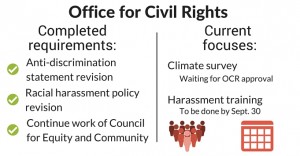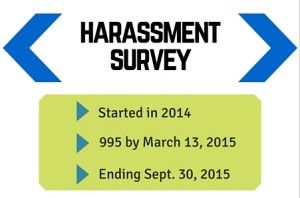Lehigh’s voluntary resolution agreement with the Office for Civil Rights is set to be completed by the end of the 2016-17 academic year.
Karen Salvemini, Lehigh’s equal opportunity compliance coordinator, is involved in the implementation and monitoring of the university’s requirements of the agreement. Many of the requirements will continue for at least another year, Salvemini said.
One requirement is the administration of a climate survey to the entire campus. Instead of using an external vendor, Lehigh was approached by a group of faculty members who conduct research pertaining to content that would appear in the survey.
Developed by four faculty members — Dominic Packer, Gordon Moskowitz, Christopher Burke and Chris Liang — the climate survey will be distributed to the Lehigh community once approved by the Office for Civil Rights.
Relationship with the Office for Civil Rights
The university is still required to report data to the Office for Civil Rights through the 2016-17 academic year as a result of last year’s investigation into an alleged “racially hostile environment.” According to the agreement, by July 1 each year, the university will provide the Office for Civil Rights with requested data under several categories the data referenced in item No. 10 for the most recently completed university year.
This data includes harassment training dates, training attendees, how the university intends to implement the concerns raised in the climate survey and more. The agreement in its entirety can be found online.
“The University understands that OCR will not close the monitoring of this Agreement until it determines that the University has fulfilled the terms of this Agreement and is in compliance with the regulations implementing Title VI, at 34 C.F.R. § 100.3, which was at issue in this complaint,” the agreement reads.
In March 2015, several administrators, including Salvemini, had a call with the Office for Civil Rights to talk about the climate survey requirements, harassment training and how these dates line up with an academic year.
As such, many of the deadlines were pushed to this fall to give the university time to implement them at the beginning of the semester. The climate survey was pushed to this academic year so it was not forced to be administered over the summer, when fewer students are on campus.
“The big things that we’re focusing on right now are the online harassment training, having that wrapped up by Sept. 30, and the climate survey,” Salvemini said.
Salvemini said Lehigh’s work with the Office for Civil Rights has been collaborative and the relationship may continue if the office would want to continue working with the university or gather information.
“Any legal obligation that we would have would end once we’ve completed all of our obligations under the voluntary resolution agreement, so there’d be no requirement that OCR and Lehigh continue their relationship,” Salvemini said.
Harassment Training
In an attempt to encourage more students to complete the required harassment survey, Salvemini worked with United Educators to put the training on Lehigh’s Course Site instead of having to log in on a separate site.
At present, there is no imposed penalty for not completing the training. But as the training will become an annual staple to Lehigh’s inclusivity initiative, Salvemini said a course registration delay is being considered for the future.
When the training was rolled out at the end of the fall 2014 semester, Salvemini said there was a great turnout for faculty and staff, so now the target is getting more students to complete the training.
“We had a low participation number from our students, so we’re trying to focus on them,” she said. As of March 13, only 995 students had completed the online harassment training, according to Salvemini.
Climate Survey
As for the climate survey, Lehigh has submitted it to the Office for Civil Rights and is awaiting a response. The office will provide the university feedback on the survey and inform it if the survey is ready to be rolled out to the campus community.
According to Salvemini, once approved, the climate survey will be implemented by the Office of Institutional Research, and a communication campaign will take place to make sure campus is aware of it. She said she hopes to be able to generate high participation rates.
Jennifer Jensen, the deputy provost for academic affairs, was made a point person on the climate survey in order to make sure faculty concerns, as well as student and staff input, were heard.
“It’s rare to do a survey where your goal is to survey every person on campus – every faculty member, every student, every staff member – and that’s what we’re doing here,” Jensen said.
The previous campus climate survey was administered eight years ago and received feedback from faculty members. According to Jensen, a number of faculty didn’t like some of the questions and didn’t feel as if it was a good research instrument.
Jensen met with the employer relations group on campus and has held faculty feedback sessions. She also worked with the Council for Equity and Community and groups with students in them to get a sense of what people thought was important for the survey.
This led to the decision to not go with an external vendor to administer the survey, which is what had been done in the past. Instead, administration was approached by a group of faculty.
Packer is an associate professor of psychology and cognitive science at Lehigh with an interest in the areas that the climate survey aims to assess. Packer, Moskowitz, Burke and Liang worked together to develop Lehigh’s climate survey.
All four men are involved with research of issues such as intergroup relations, bias, prejudice, discrimination and have been involved in diversity initiatives on campus.
They believed, Packer said, that it would be better to develop the survey internally, as they know about Lehigh and care about the institution. After receiving permission from the Office for Civil Rights to use an internally developed climate survey, the four consulted with various groups to decide what is most important to the Lehigh community to asses.
It was mandated that the survey focus on issues of race, ethnicity and national origin, but Packer said they also decided to address other issues of bias such as gender, sexual orientation and socioeconomic status.
The survey is projected to take 15-20 minutes to complete, Packer said.
“What we really want is just honest answers,” he said. “Not everyone will agree there’s climate problems and that’s important to know.”
After the survey is completed, the results will be prepared into an initial report by the Office of Institutional Research and be made available to the Lehigh community. Packer and his team will also receive the information to be interpreted from a research and psychologist’s perspective.
The campus will be surveyed in some capacity for the next three years, whether it’s the same survey or if another one is developed to hone in on a particular issue.
“The goal is definitely to see how things change over time, and hopefully things get better over time,” Packer said.
Jensen said Lehigh does survey its population in other ways such as faculty surveys or the senior exit survey, but these do not reach everyone. She said her personal goal is to get a response from a variety of groups such as graduate students, international students, staff and underrepresented groups as well as majority students.
“This is an opportunity, no matter what part of Lehigh they’re in, to tell us how they feel and what they perceive Lehigh to be in terms of culture and environment, and I think that’s phenomenally important,” Jensen said.







Comment policy
Comments posted to The Brown and White website are reviewed by a moderator before being approved. Incendiary speech or harassing language, including comments targeted at individuals, may be deemed unacceptable and not published. Spam and other soliciting will also be declined.
The Brown and White also reserves the right to not publish entirely anonymous comments.